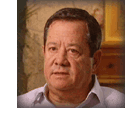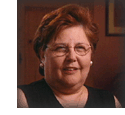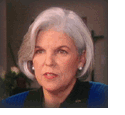



A political commentator and a moderate on the Cuba
issue
[Castro]'s going to be their eternal enemy until they die. That's the way
they see it, no doubt about it. Back in 1978, Fidel Castro even tried for the
first time to change policy in relations to Cubans in the United States, and he
carried out what was known as the dialogue sessions. He invited Cubans from
the United States to come and dialogue and find a solution, for example, to
release political prisoners, or to allow Cubans from the United States to
travel to Cuba. Immediately, all those who, one way or the other, thought that
that was an answer were called traitors in Miami. I was in Miami at the time,
and the businesses were bombed, people lost their jobs. Professional people
who were established in very prosperous businesses lost those opportunities
because of the social pressures.




Professor at Florida International University,
where he founded the Cuban Research Institute.
...This is a highly personalized sort of conflict. If you talk to Cuban
exiles about Cuba, instead of using terms like "the communist system" or "the
government" or anything like, that they're more likely to say "Fidel Castro,"
It's a very personalized conflict that even finds its way into the laws that
the US has written and enacted, which have in part been written by Cuban
exiles. The Helms-Burton bill actually says that a precondition for improving
US relations with Cuba is that Fidel Castro and Raoul Castro, by first name and
last names, have to be out of there.. . . Emotion is, in many ways, a driving
force. It sometimes keeps people--as the Elián case pointed out--from
seeing things rationally, or pragmatically. You could make the argument to
many people here in Miami that the embargo is helpful to Fidel Castro. It
keeps him isolated. It enables him to blame others for his troubles. But
people here wouldn't be interested in that. The embargo cannot be understood
as a rational, pragmatic measure to overthrow the Cuban government. It has to
be understood in emotional terms. If you lift the embargo, for many Cuban
exiles, it means Fidel will have won.




Executive director of the Cuban Committee for Democracy
I think it's because he is the charismatic leader that they feel took the
country away from them. He made it impossible for them to live in their own
country and he's still alive. So while he's alive, you focus everything on
that one man. Never mind that there are 11 million other people there. And
never mind that things have changed, especially in the last ten years. We
still think that if Fidel rules everything and Fidel took our country away from
us, now we need to hate Fidel. And if we hate Fidel, we have to make sure that
Fidel gets nothing.
There is a saying that I'm going to translate very loosely: "Give nothing
to the bloody dictator." So that plays into that. "Do not give Elián
to Fidel. Let's keep little Elián away from Fidel." They think this
man is going to live forever. You have to take into account that Elián
is six years old. Whatever possesses them to think that when Elián is
22 or 23, Castro is still going to be alive and the country is still going to
be the same? I'm a lot more of an optimist than they are, I think.




Director of Mothers Against Repression, and a hard
liner
Yes, of course [I saw Castro's hand in this]. This is not a normal custody
case, because Cuba is not a normal country. I still have yet to find someone
willing to assert that Cuba is not under the yoke of a totalitarian dictator
who controls every aspect of a Cuban's life, including children. In our
opinion, the father could not speak for the child, because Castro was speaking
for the father.


home · analyses · interviews · timeline · discussion
video excerpt · links · readings · synopsis
tapes & transcripts · press · credits
frontline · wgbh · pbs online
web site copyright WGBH educational foundation
top photo © afp/corbis
 |  |